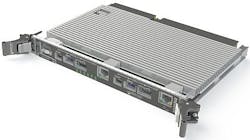6U OpenVPX embedded server based on 4th generation Intel Core i7 introduced by Mercury
CHELMSFORD, Mass., 11 June 2013. Mercury Systems Inc. is introducing the rugged Ensemble series 6U OpenVPX HDS6502 high-density server (HDS) module based on 4th generation Intel Core i7 processors, which were unveiled last week.
The single-board computer integrates dual quad-core Intel Core i7-4700EQ processors with native Intel Advanced Vector Extensions 2.0 and PCI Express Gen 3, an OpenCL programmable graphics processing unit (GPU) and as much as 16 gigabytes of 1600 MHz DDR3 SDRAM.
The HDS6502 embedded computing board is for OpenCL deployment and is configured with others to form subsystems to meet application-specific requirements, company officials say.
The HDS6502 facilitates a straightforward migration of existing Mercury modules, officials say. Initially, HDS6502 modules will support Serial RapidIO Gen 2 and 10 Gigabit Ethernet with backward compatibility with software protocols including interprocessor communication system (ICS) and message passing interface/open fabrics enterprise distribution (MPI/OFED).
The FPGA implementation of POET provides designers with the ability to upgrade to fabrics types, and facilitates user customization and security.
HDS6502 modules I/O includes PCI Express Gen 3 to the expansion plane, eSATA, USB 3.0, Ethernet, serial ports, and several graphic interfaces. The card's single die cache coherent memory architecture between the CPU and GPU resources offers low I/O latency and reduced module power consumption.
This is a characteristic of multidimensional computing applications requiring high throughput, determinism and low latency, such as signals intelligence, image intelligence, radar, infrared sensor processing, and large data and graphics rendering.
HDS6502 modules will be available next fall for deployment in air-cooled, air flow-by and conduction-cooled systems with Serial RapidIO Gen 2 and 10 Gigabit Ethernet data fabric support. Support for InfiniBand and 40 Gigabit Ethernet-based modules will follow, company officials say.
For more information contact Mercury Systems online at www.mrcy.com.

